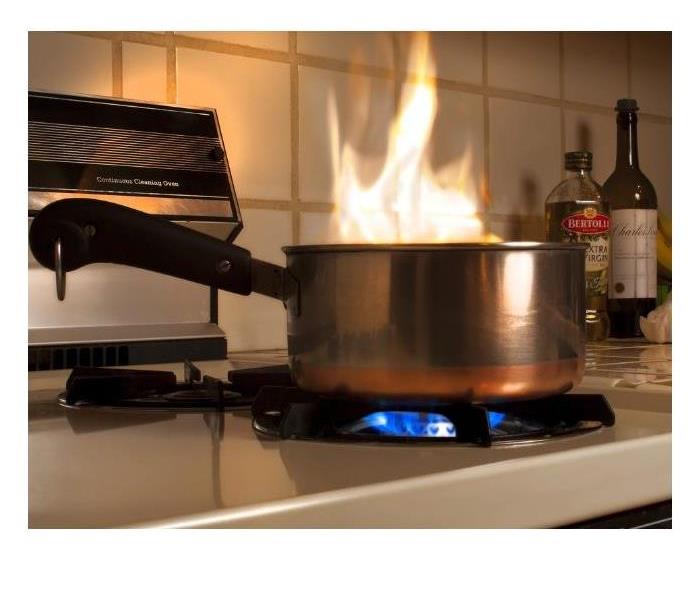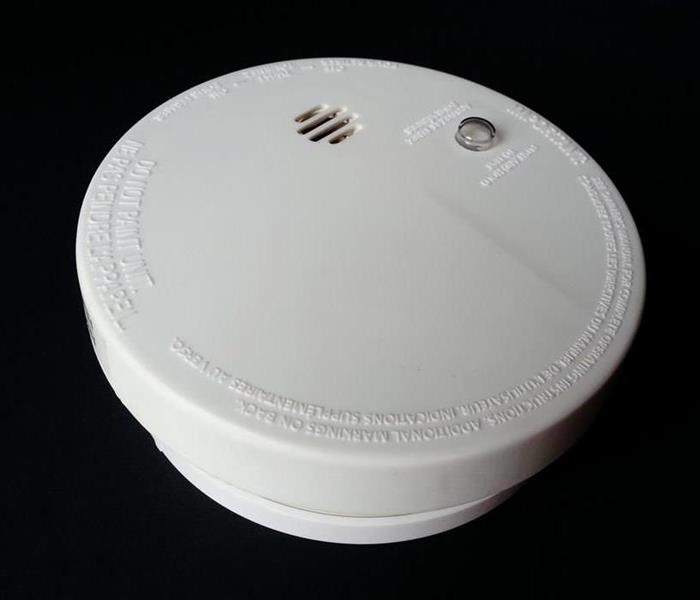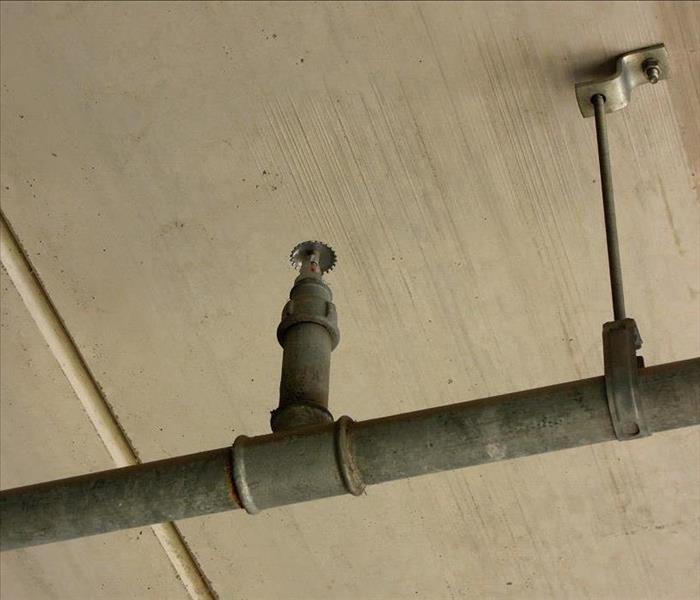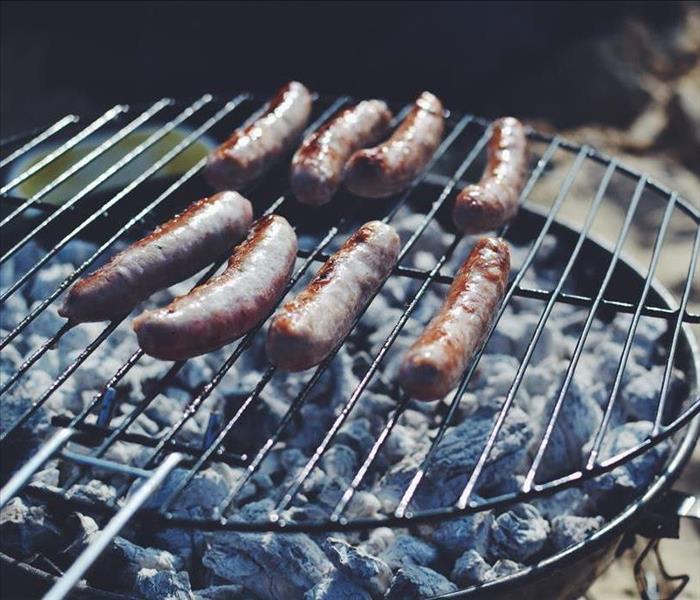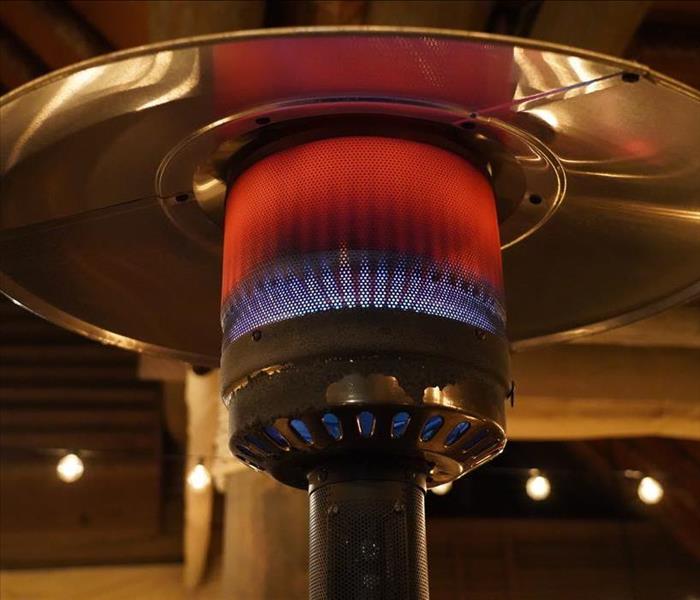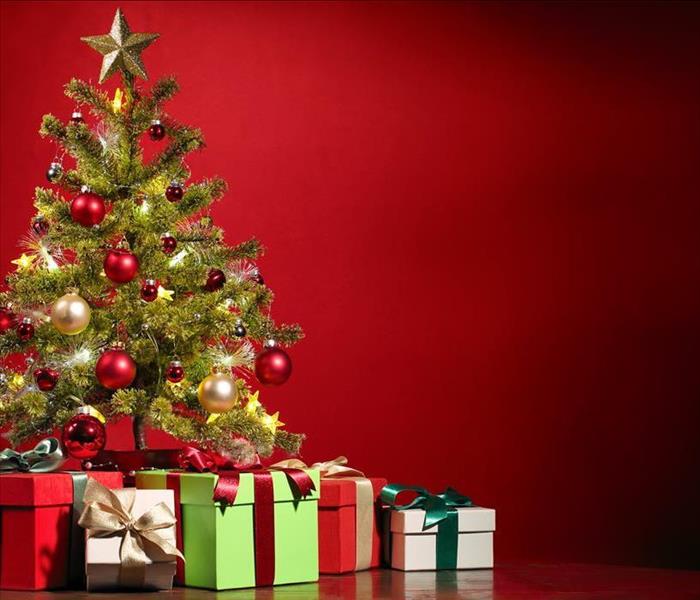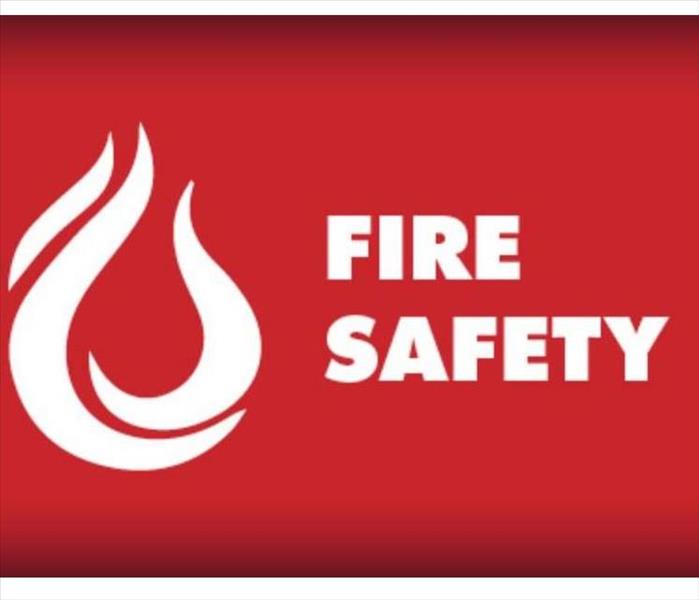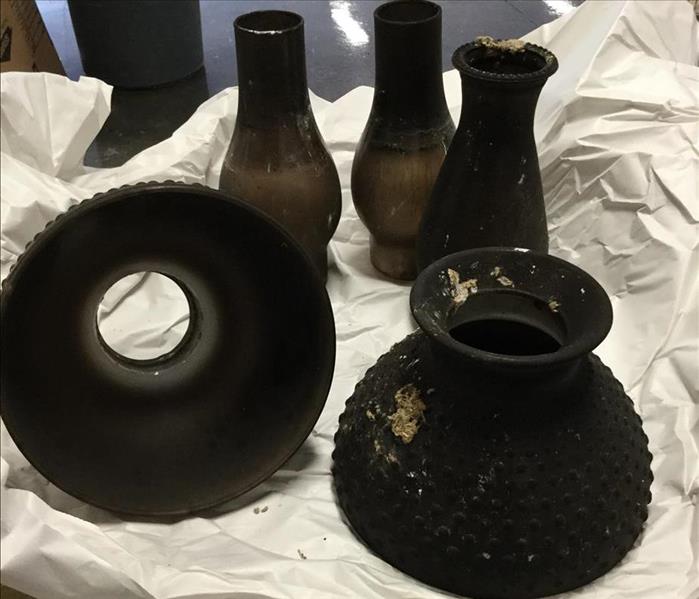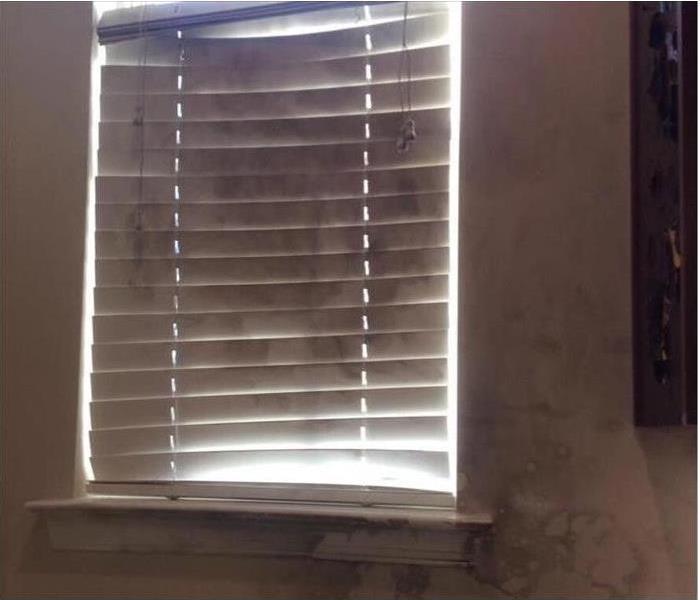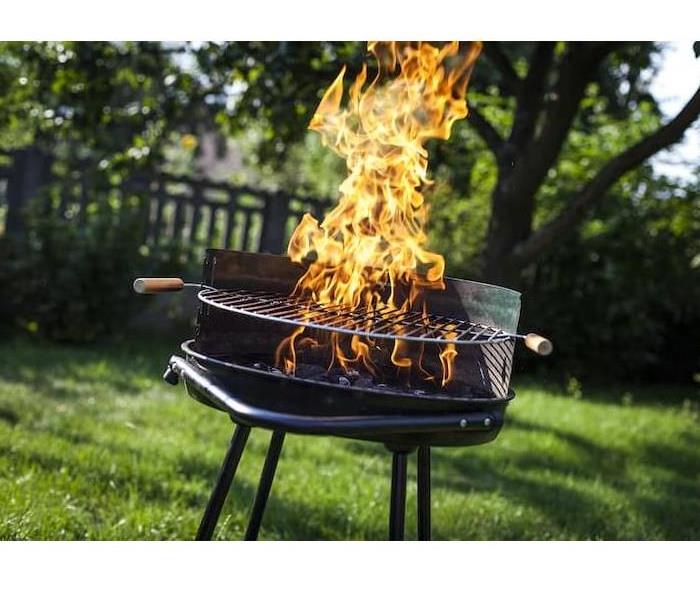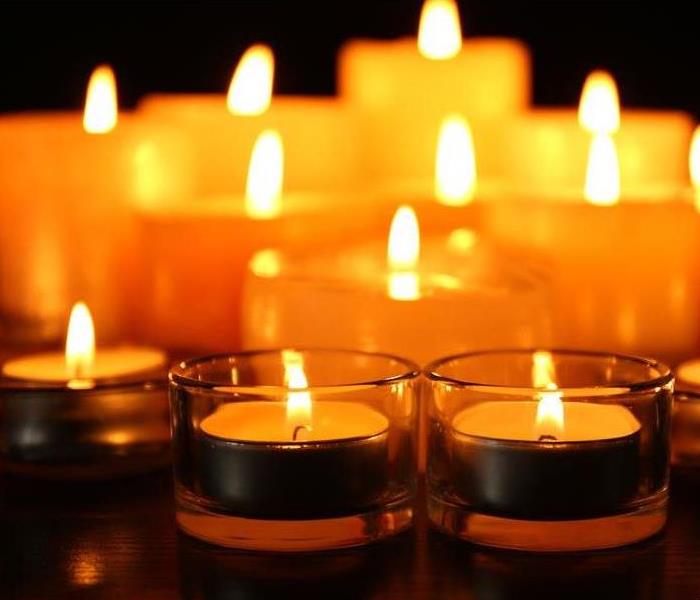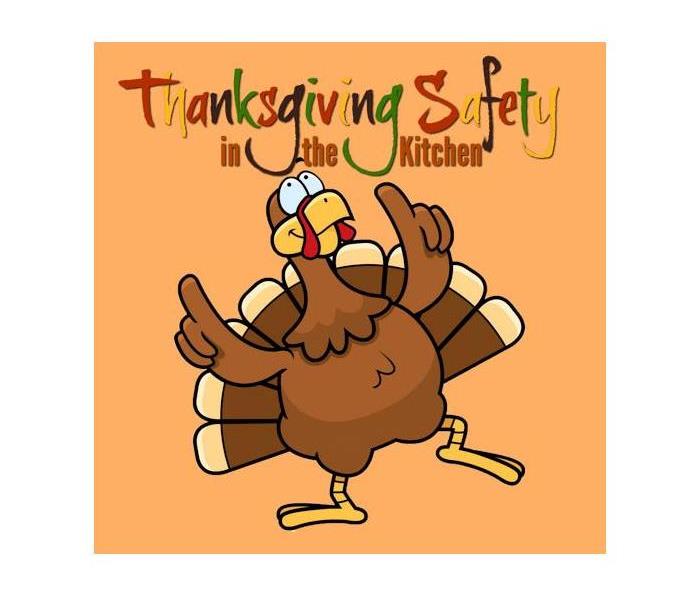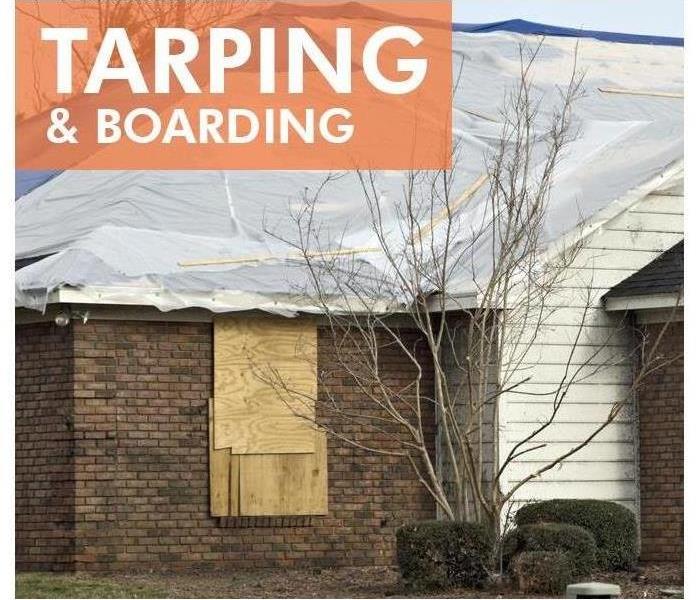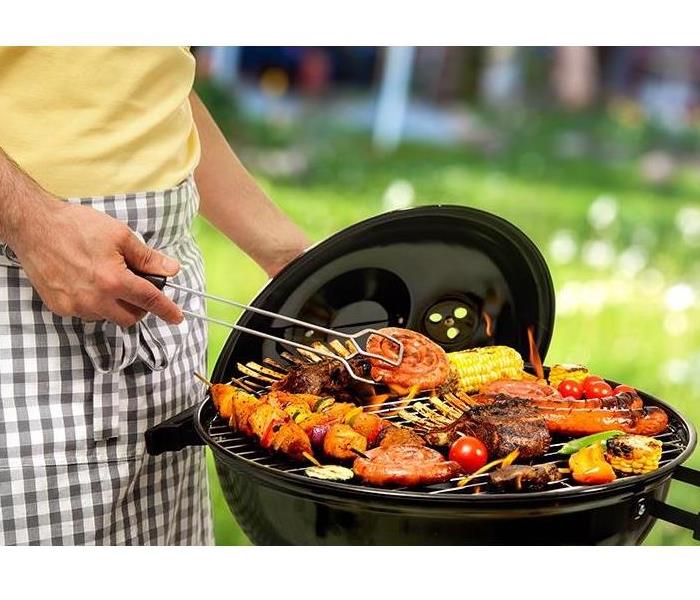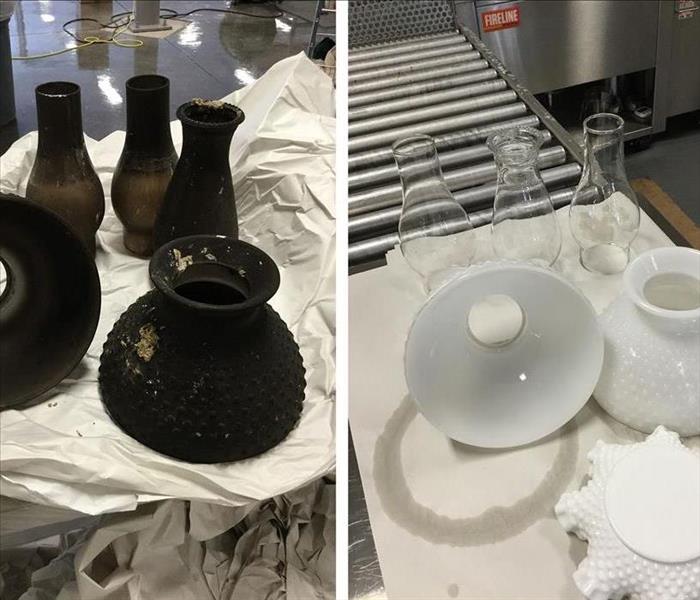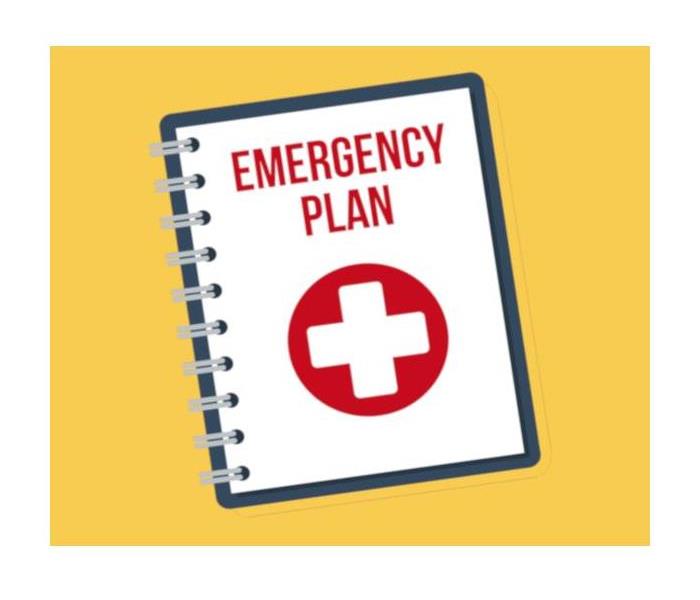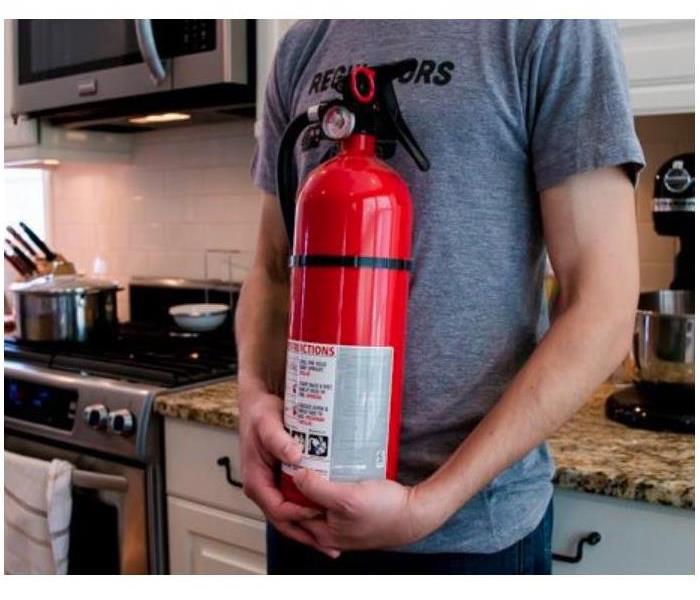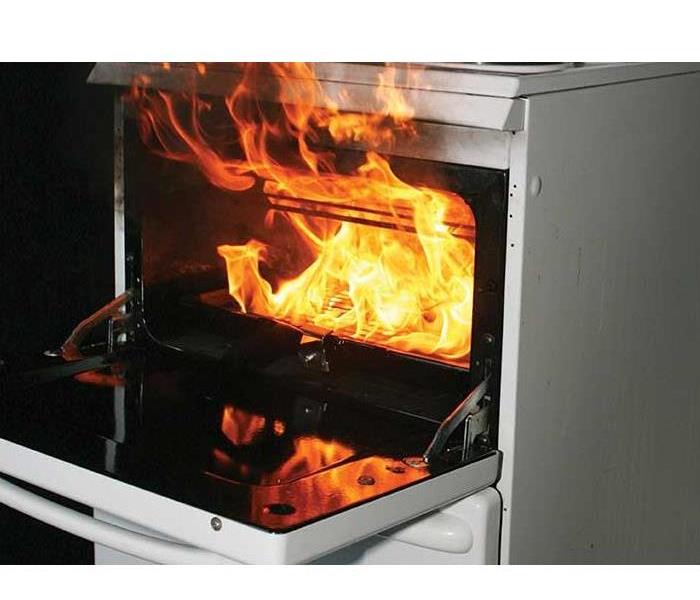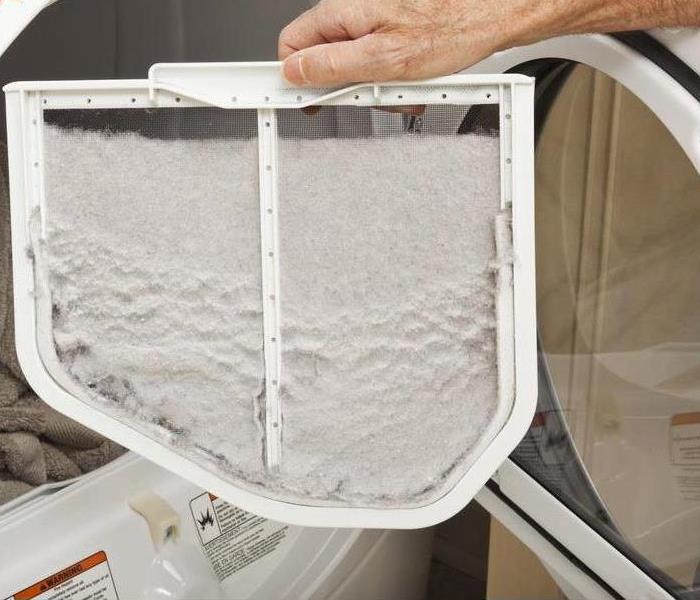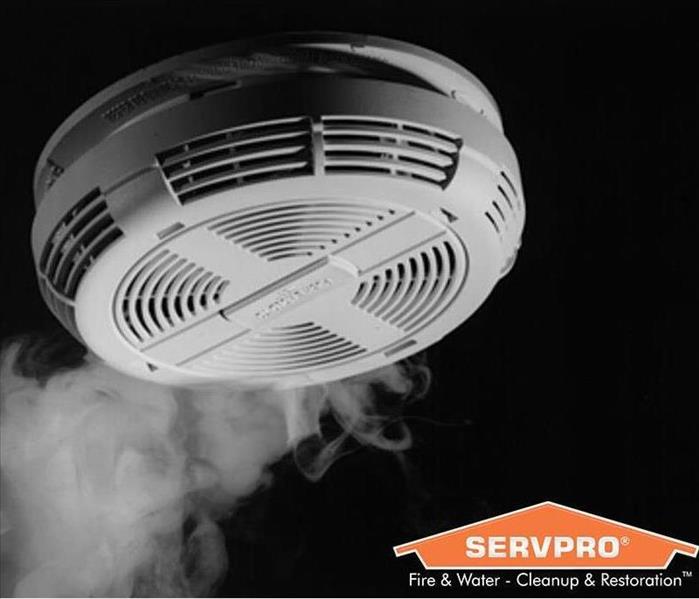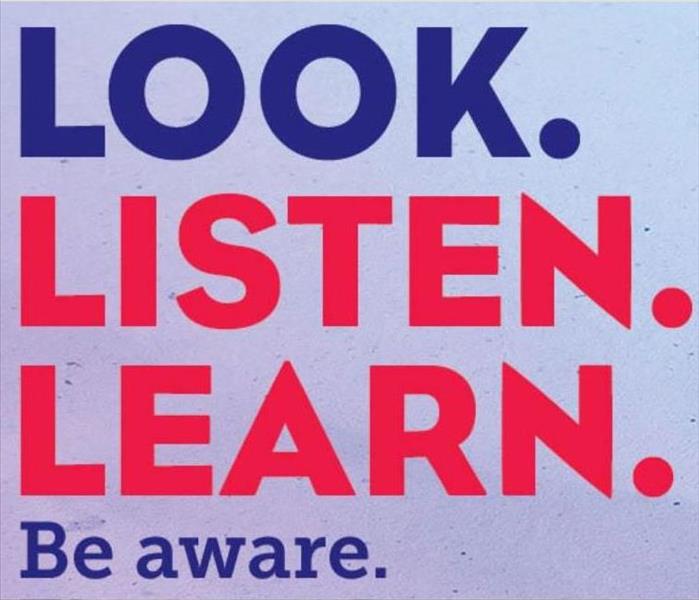Archived Fire Damage Blog Posts
Cooking Fires
10/15/2024 (Permalink)
Fires involving cooking are the number one cause of residential fires, and about 50% of these cooking fires involve grease. It is important to understand how to properly put these fires out, if possible, in order to help prevent further damage to your home.
- Never Use Water
- Putting water on a grease fire can cause the oil to splash and spread the fire to more areas of the home and cause serious harm to you as well.
- Turn off the Heat Source
- If the fire is small and you can do so without hurting yourself, turn off the stove, or if it is in the oven turn off the oven and leave the door closed.
- Cover the Fire
- Using a metal baking sheet or lid, cover the pan that is on fire. This will help reduce oxygen to the flames and hopefully help to extinguish the fire as quickly as possible. This is the same reason that you should not open the door to the oven if something catches fire in there.
- Putting Out the Flames
- If covering the fire with a pan or lid isn’t an option, you can use salt or baking soda to cover the fire and hopefully smother the flames. Be aware that it will take a lot of baking soda or salt to properly cover the fire and put it out.
- Fire Extinguishers
- If neither of the above methods work, you can use a fire extinguisher to put out the flames. Be sure to use a properly rated fire extinguisher. Class K extinguishers are meant specifically for putting out kitchen/grease fires and you should have one in your kitchen if you do not already in case of emergency. NEVER use a class A fire extinguisher on a grease fire as these are water based and can make the fire worse.
- Cleaning Up the Damage
- Even small fires are capable of covering your kitchen in nasty smelling smoke and soot residue. Particles of soot from animal fats and other food products are sticky hard to clean, and often require professional help to clean up.
If your home experiences a kitchen fire, Your local SERVPRO is here to help! Our team of professionals is always training in the latest techniques and technologies to help ensure that cleaning up your home after a fire is done in the most efficient and effective way possible.
How Many Fire Detectors Do You Need?
8/25/2022 (Permalink)
When it comes to smoke alarms, many homeowners do not realize that most homes require more than just a couple of alarms in order to properly give a warning in an emergency scenario. Here are a few things to keep in mind when figuring out how many smoke alarms your home will need.
The safest smoke alarms are ones that are hardwired and interconnected. This means that when one alarm goes off, they all go off. This is important because you may not hear an alarm go off in a different area of your house if you are too far away or behind closed doors. If your home has interconnected smoke alarms, you can still add battery-powered stand-alone alarms as well for additional safety.
According to the National Fire Protection Association, your home should have at least one smoke alarm on every level of the home including the basement. Additionally, there should be one in every bedroom and outside of every sleeping area. For example, a two-story home, with two bedrooms and a basement should have a minimum of five smoke alarms. One on each floor, and one in each bedroom. Another thing to consider is their placement, for example, if your smoke alarm is in your kitchen, you should place it at least ten feet from the cooking appliances like the stove and oven to help mitigate false alarms. You can also use a photoelectric type of alarm in your kitchen to further mitigate the chance of false alarms.
Smoke alarms don’t prevent fires, but they are the first line of defense for your family in an emergency. Properly functioning fire alarms are a crucial part of your home safety. You should check them once a month to ensure proper function and replace the batteries twice a year, usually, people use switching the clocks for daylight savings time as a reminder of when to change the batteries. Additionally, smoke alarms should be replaced every ten years.
While we hope you won’t ever have to call us, if you should find yourself in need of a professional fire restoration company SERVPRO of Richmond and SERVPRO of Henrico is here to help. With over 35 years of experience in the restoration industry, our teams are equipped with the knowledge and expertise to help make your fire loss “Like it never even happened.”
Things to Know about Fire Spinklers
8/15/2022 (Permalink)
Selecting the best fire sprinkler system for your commercial building can be a tough decision. There are many different options, all with their own pros and cons, and each with specific applications in mind. Here are a few things that you should consider when choosing your fire sprinkler system.
- Different Suppressors – The typical sprinkler system uses water to put out fires, but there are other kinds as well. If your building has a lot of machinery or electronics that can be damaged by water, there are also chemical suppressants, and even systems that use inert gasses to smother the fire that won’t damage electronics.
- The Amount of Suppressant – Different systems will use different amounts of suppressant. Depending on your building's size and use, this is something else that you should consider.
- Trigger Types – This is the part of the sprinkler that will cause it to activate and there are a few different types. Some are electronic sensors that are connected to the system and will trigger when they detect the presence of smoke, and others involve components that will break or burst at a certain temperature.
- Location – Deciding where to place your sprinklers is another important factor in your sprinkler installation. For this, it’s best left to a professional to walk your building with you and point out the key areas where they should go.
- Cleanup – One final thing that you should consider is the cleanup process. Because different systems use different means to smother the fire, the means by which you’ll need to clean up afterward will be different. In most cases, you’ll need the services of a professional company to properly clean up after the system is set off.
Choosing the right sprinkler system for your building is a crucial part of making sure you minimize the risks of fires for your business. While sprinklers do not stop fires from happening, a properly functioning fire suppression system could be the difference between a small business interruption, and a total loss of property. If your business has experienced a fire, our team here at SERVPRO of Richmond and SERVPRO of Henrico is available 24/7, 365 days a year for emergency services. Give us a call and let us know how we can help you get your business back to “Like it never even happened.”
Things To Throw Away After a Fire
6/16/2022 (Permalink)
Fires in your home are always a traumatic and overwhelming experience. Once the fire department leaves and it’s time for cleanup to begin, it can sometimes be difficult to know what items are okay to keep or can be salvaged, and what items should be thrown away. Here are some things that should always be thrown away and replaced.
Cosmetics – Heat can alter the composition of the makeup and melt or damage the containers that they come in. In addition, soot, ash, or fire extinguishing chemicals can make their way into the cosmetics and then onto your skin if you use them.
Medicine – Similarly to cosmetics the heat can alter the composition of the medications and change their effectiveness or have potentially harmful effects. It’s also possible for the soot and ash to get inside the bottles and you don’t want to ingest these should they get on your medications.
Perishable food – All perishable foods should be thrown away. It is possible that things in your fridge or freezer are okay, but if there is any evidence that the power was lost or if the room affected was the kitchen those should be thrown away as well.
Non-Perishable food – Despite the fact that non perishables typically are in containers like aluminum cans it is still possible that they can be ruined if exposed to a fire. The heat can cause bacteria to grow or damage the cans, and soot/smoke can still penetrate the can and spoil the foods. If there are any signs that your non-perishables were exposed to heat or smoke, they should be thrown out.
Charred clothing, bedding, upholstery – Any of these items that are visually burned are unfortunately not salvageable. Despite cleaning them it may not be possible to completely remove any odors or contaminants from the items.
Furniture and mattresses – Smoke and soot can easily penetrate soft and porous items like these and they are very difficult to clean completely. It can be nearly impossible to remove smoke odors from furniture and beds, and thus it’s best to just get rid of them.
If you experience a fire in your home, our team is IICRC certified in fire damage restoration and can help walk you through your affected items to help you decide what can and cannot be salvaged. SERVPRO of Richmond and SERVPRO of Henrico is available 24/7, 365 days a year for all of your emergency fire damage needs.
Grilling Safety
6/3/2022 (Permalink)
Warm weather is finally here and what better way to spend some time outside with friends and family than with a cookout! Grilling food is always a great time but it’s important to make sure that you take the proper safety precautions to avoid any accidents!
1) Your grill should be placed away from your house. If placed too close to your home the heat from the grill can damage your siding or worse if the flames get out of control, light your house on fire. For these same reasons you should not place your grill on your patio or deck, as well as underneath a roof or overhang.
2) Cleaning your grill regularly is an important part of grill safety. Leftover grease and food scraps on a grill can build up and become a fire hazard. If you use a wire brush to clean your grill, be sure to check that the brush isn’t damaged as you don’t want to leave any metal bristles behind to get in your food.
3) Never use a grill indoors or in an enclosed area. Grills produce carbon monoxide when lit and if used in an area without proper ventilation you can get carbon monoxide poisoning. It’s also a fire hazard.
4) Inspecting your grill should be done along with cleaning before each use. If your grill uses propane be sure that the tank is not damaged and all the lines are properly secured with no leaks.
5) When it’s time to put the grill away make sure that you give it time to cool off first. Grill covers are made of plastic and can melt or catch on fire if the grill is still too hot. In addition, if you use a charcoal grill be sure to dispose of the ashes in a metal container and store them away from your home. Ashes from a grill can still catch on fire.
Everyone loves to spend time outside and grilling food for your friends and family is a great way to do that. As long as you follow the proper safety procedures you can help to ensure that no emergencies will happen. If you do however have a fire emergency due to your grill this summer SERVPRO of Richmond and SERVPRO of Henrico is here to help! Our team of highly trained technicians are available 24/7, 365 days a year to help make your fire damage “Like it never even happened.”
Portable Outdoor Heater Safety
3/21/2022 (Permalink)
Everyone loves to spend time outside but during the winter months as the temperatures drop it can be difficult to do. Many people will enlist the help of portable heaters and fires to keep them warm. These activities are perfectly safe to do as long as you understand that they are also fire hazards. Luckily, as long as you take the proper safety precautions these hazards can be reduced greatly:
- Follow all manufacturer’s instructions for usage of fuel and fire starters.
- Portable heaters should only be filled with the recommended fuel types
- Never use gasoline or other flammable liquids in fire pits or campfires
- Propane for heaters should always be stored properly
- Always be present
- Never leave a portable heater running unattended, if you have to step away even for a moment turn it off and turn it back on when you return
- If you have a fire, you should keep a bucket of water or a hose within reach while the fire is lit
- When you put a fire out, stir the ashes around and make sure that all of the embers are extinguished and there aren’t any buried that are still smoldering
- Be mindful of placement
- Portable heaters need to be placed on a level surface in a spot where they won’t be bumped or knocked over
- Fire pits should be at least 10 feet away from your house
- Watch children and pets and make sure they stay a safe distance from any heat sources
- If you’re having a campfire the fire should be at least 25 feet from structures or anything that can burn, and always check for overhanging branches
Following these tips will allow you and your family to enjoy being outdoors, even when it gets cold, while still remaining safe.
Christmas Tree Safety
11/15/2021 (Permalink)
Christmas time is just around the corner and there’s nothing more exciting than setting up the Christmas tree. Did you know that almost one third of all Christmas tree fires are caused by electrical problems? How about that while uncommon, when Christmas tree fires do happen, they are more likely to be serious?
Follow our list of tips to keep your family safe and help keep your home from suffering any fire damage this holiday season.
- Picking the tree – Make sure that when you’re looking for a tree that it is fresh and that green needles do not fall off when you touch them
- Placing the tree – Cut off the end of the base of the trunk before you place it in the stand. Make sure that wherever the tree is located is at least three feet from any heat sources. Don’t forget to water the tree daily to make sure it does not prematurely dry out.
- Lights – Make sure to check that your lights are meant for indoor use before putting them on your tree. Replace any strings of lights with worn out cords or broken bulbs. Do not forget to turn the lights off when you leave the house or go to bed
Fire damage to your home is always an incredibly unfortunate event, but even more so during the holiday season. Your neighborhood SERVPRO of Richmond and SERVPRO of Henrico is here to help with any fire damage restoration and clean up that you may need following an accident to help get your holiday season back on track.
Fire Prevention Week - Home Escape Plans
10/4/2021 (Permalink)
During Fire Prevention Week, our SERVPRO of Richmond and SERVPRO of Henrico team wants you and your family to be fully prepared in case there is a fire in your home. Planning you and your family’s escape could make all the difference should you ever have to encounter a fire emergency. First, get the facts:
- According to the National Fire Protection Association, 1 out of 3 American households have developed and practiced a fire escape plan at home.
- Although about 71% of Americans have an escape plan, only about 47% of those actually practiced it.
- You may have less than 6 minutes before a fire in your home becomes life-threatening.
Check out these home Escape Safety Tips from the NFPA:
- Make an escape plan with your household by drawing a map of the home including doors and windows and discuss the plan with everyone.
- Make sure you identify at least two ways out of every room
- Establish an outdoor meeting spot for all household members to meet once escaping the home
- Practice this escape plan at least twice a year
- Teach children how to escape on their own in case you can’t help them
- Always close doors behind you when leaving
Richmond, VA Smoke and Soot Cleanup
8/25/2021 (Permalink)
If a fire erupts in your home or business, the flames are not the only thing you need to worry about affecting your structure and belongings.
Smoke and soot are almost always going to linger and affect everything in your home and it can even penetrate various cavities within your home. The smoke and soot reaching these cavities will damage the structure and cause a foul odor that needs immediate attention.
That’s why it’s important to call SERVPRO of Richmond and SERVPRO of Henrico so our smoke damage expertise and experience can inspect and accurately assess the extent of the damage, while developing a comprehensive plan of action.
Smoke and soot facts:
- Hot smoke migrates to cooler areas and upper levels of a structure.
- Smoke flows around plumbing systems, seeping through the holes used by pipes to go from floor to floor.
- The type of smoke may greatly affect the restoration process.
Different Types of Smoke
- Dry Smoke: Fast-burning, high-temperature fires, heat rises therefore smoke rises. Paper and wood materials produce this type of damage.
Wet Smoke: Low heat, smoldering, pungent odor, sticky, dense. Smoke webs are more difficult to clean. Plastic and rubber produce this type of damage.
Call the professionals at 804-740-6151 to clean up any smoke and soot damage or residue after a fire in your home or business.
The Importance of Smoke Alarms
8/12/2021 (Permalink)
Smoke alarms are a necessary and effective tool to protect your home or business and the people in it. When there is a fire, smoke spreads fast. Working smoke alarms give you an early warning so you can get outside quickly. Here are some tips to give you peace of mind that your smoke detectors will work when you need it most:
- Know what kind of smoke detector you have: There are two types of smoke detectors commonly found in homes and businesses. A battery-operated smoke alarm is commonly found in households. An AC powered smoke detector, also known as hard-wired, is usually found in businesses. These detectors require battery backup to ensure that even during a blackout or an electrical fire, they will still function properly.
- Ensure there are smoke alarms in the appropriate places: Places like hallways, stairs, sleeping areas need to have smoke alarms near them. Check with your local fire department to ensure you follow proper regulations. The NFPA maintains fire prevention codes and requirements for all types of occupancies. Explore the National Fire Alarm and Signaling Code and the Life Safety Code from NFPA to ensure you have the latest information and are complying.
- Test the range of the alarm: Have someone stand at the farthest point away from the smoke alarms. This will help distinguish if another alarm needs to be installed, especially if the sound is muffled or low.
- Change the batteries: Batteries in a smoke detector should be changed once a year, at the least. Do not wait until your alarms chirp to install fresh batteries. A useful trick to remember is to change your batteries when you change your clocks for daylight savings time.
- Replace your alarms every 10 years: Replacing your smoke alarms every ten years helps ensure you have the latest technology and the best protection for your family and your home. “Long-life” smoke alarms even need to be replaced. The non-removable batteries in long-life smoke alarms only have a 10-year guarantee.
Checking your smoke detectors regularly is a critical and simple measure you can take to help keep your family and co-workers safe should the unexpected occur.
Summer Fire Safety Tips
6/29/2021 (Permalink)
Here are some tips to keep in mind as you and your family enjoy summer vacations, camping, family gatherings, picnics, and the Fourth of July.
- When camping, always build a campfire at least 25 feet away from tents, shrubs, and anything that can burn.
- Want to see Fireworks this summer? We recommend you go to a public show put on by experts. Sparklers can reach 1,200 F and can cause third degree burns.
- When using anything with an open flame or can burn, like a fire pit or grills, make sure they are at least 10 feet away from your home.
- Always use propane, charcoal, wood pellet barbecue grills outdoors only. Indoor use can cause a fire or carbon monoxide poisoning.
- Place your grill away from siding and deck railings, and out from under eaves and overhanging branches. Do not store or use a grill on a porch or balcony.
If you or someone you know experiences a fire in their home or business, contact SERVPRO of Richmond ad SERVPRO of Henrico at 804.740.6151.
Things to Know When Burning Candles in Your Home
6/9/2021 (Permalink)
Candles are known for celebrations, relaxation, and even just having an inviting smell in your home. However, a lighted candle is also an open flame, and can be a potential fire hazard if not monitored properly. In fact, an estimated 8,200 home fires are started by candles each year according to the National Fire Protection Association.https://candles.org/fire-safety-candles/ Here are some simple tips to keep in mind so you can continue to burn your candles happily and safely:
Lighting a candle. Trim the wick at least ¼ inch prior to burning. Always keep wick trimmings and any debris out of the pool of wax. Be knowledgeable of the burn times of the candle you are using, only burn within that time.
Secure the area. Place the candle on a stable, heat-resistant surface. Keep burning candles away from furniture, drapes, bedding, carpets, books, paper, flammable decorations, etc. Avoid drafts, vents, or air currents.
Keep candles out of the reach of children and pets. Do not place lit candles where they can be knocked over by children, pets, or anyone else.
Keep candles 3” apart. When burning multiple candles, be sure to place each candle at least three inches apart from one another. This is to ensure they do not melt one another or create their own drafts.
Do not walk away. Never leave a burning candle unattended or lit while sleeping. Always make sure the candle is completely out and the wick ember is no longer glowing.
Do not touch or move the candle. Never move a candle container when the wax is liquified, wait until it has completely cooled.
Extinguishing a candle. Use a candle snuffer to extinguish a candle. Do not use water to extinguish a candle, this can cause hot wax to splatter and could break a glass container due to temperature changes. Never use a knife or sharp object to remove wax drippings. Extinguish a candle if the flame becomes too high or flickers repeatedly.
If you experience a fire or smoke damage in your home, please call the professionals at SERVPRO of Richmond and SERVPRO of Henrico at 804-740-6151.
Grilling Safety To Avoid Fires
3/31/2021 (Permalink)
Warmer weather means everyone starts to fire up their grill and host cookouts in their backyards. However, if you are not taking the proper precautions with grill safety, it can quickly turn into a potentially dangerous situation. Check out these tips for practicing grilling safety precautions, so you have the best outdoor grilling experience.
Do:
- Clean your grill regularly. Grease is a major reason for dangerous flare-ups
- Keep grill 10 feet away from the house. This includes carports, garages, and porches. This applies to both charcoal and gas grills.
- Check for gas leaks. Inspect all the hoses for cracking, holes, abrasions and check the gas tank for dents, punctures, or rust.
- Keep a fire extinguisher within a couple of steps of your grill. Make sure you understand how to use it in case of an accident.
- Keep decorations away from your grill. Decorations like hanging baskets, pillows, and string lights could catch fire if too close to the flames.
Don’t:
- Leave a grill unattended. Focus on grilling and get a friend to help with prep and runs to the kitchen.
- Overload your grill with food. Fatty meats are especially dangerous if fat drips and causes a flare-up.
- Use a small grill indoors. This is a major fire hazard and can release carbon monoxide, the deadly colorless, odorless gas.
If you experience fire damage to your home or business, call SERVPRO of Richmond and SERVPRO fo Henrico at 804-740.6151.
Thanksgiving Cooking Safety
11/17/2020 (Permalink)
According to the National Fire Protection Association, cooking is the leading cause of home fires and injuries. We want you and your family to celebrate safely this year so keep these tips in mind while cooking in this kitchen this holiday:
- Never leave the kitchen while cooking on the stovetop. Some types of cooking, especially those that involve frying or sautéing with oil, need continuous attention.
- When cooking a turkey, or other items in the oven, stay in your home and check on it regularly.
- Set a timer on your stove or phone to keep track of cooking times, particularly for foods that require longer cook times.
- Keep things that can catch fire like oven mitts, wooden utensils, food wrappers, and towels away from direct contact with the cooking area.
- Avoid long sleeves and hanging fabrics that could come in contact with a heat source.
- Always cook with a lid beside your pan. If you have a fire, slide the lid over the pan and turn off the burner. Do not remove the cover because the fire could start again. Let the pan cool for a long time. Never throw water or use a fire extinguisher on a grease fire.
- For an oven fire, turn off the heat and keep the door closed. Only open the door once you’re confident the fire is completely out, standing to the side as you do. If you have any doubts or concerns, contact the fire department for assistance.
- Keep children at least three feet away from the stove and areas where hot food or drink is being prepared or served. Steam or spills from these items can cause severe burns.
Although the Covid-19 pandemic will limit the number of people in your home this year, it's still important to be mindful and careful when cooking inside your home.
Fire Prevention Week 2020
10/6/2020 (Permalink)
Every year the National Fire Protection Agency recognizes Fire Prevention Week to inform and teach children, adults, and teachers how to stay safe in case of a fire.
This year's theme is: Serve Up Fire Safety In The Kitchen. According to the NFPA, cooking in the kitchen is the #1 cause of home fires and home fire injuries. They have also concluded that unattended cooking is the leading cause of fires in the kitchen.
Check out some quick tips to prevent a fire disaster:
- keep kids safe from burns and scalds by creating a kid-free zone of at least 3ft around hot things in the kitchen.
- keep your cooking area clutter-free. Move anything that can burn away from the stove top
- focus on the food. unattended cooking is the leading cause of kitchen fires
- be smart when cooking, use a timers to remind you that you are cooking
- clubbing and cooking don't mix, after a night out, order in!
- put a lid on it to extinguish a small grease fire
Board Up Services After a Fire
7/21/2020 (Permalink)
SERVPRO of Richmond and SERVPRO of Henrico Provides Board Up Services.
In the unfortunate event of a fire in your home or business, our team will respond 24/7 with emergency services to board up and secure your windows and roof following a damage.
It's important to act right away and call the professionals to handle your board up to prevent further damage from the elements, such as wind or rain. Not only do you want to act quickly to prevent further damage, but you also need to keep your insurance in mind. If you fail to properly board up your home, your insurer may not cover the fire damage citing delayed response to secure the home.
Always call the professionals to handle your board up needs. We will use the proper materials and tools to safely and correctly secure the windows and roof from further damage.
SERVPRO of Richmond and SERVPRO of Henrico is always here to help board up your home after a fire damage and will also help remediate and restore the damages inside the home. Call today at 804-740-6151.
Grilling Safety This Summer
7/14/2020 (Permalink)
It's the time of year when families spend their summer evening preparing dinner on the grill. This great American past time brings great memories and delicious meals, however, it can also produce some serious concerns for the safety of your family and your home.
According to the National Fire Protection Association, In 2014-2018, fire departments went to an annual average of 8,900 home fires involving grills or barbecues. This included 3,900 structure fires and 4,900 outside or unclassified fires.
Follow these tips to ensure you are grilling safely:
- keep the grill in a location away from the home and out from under trees and structural coverings
- always clean your grill before and after use to remove grease and grime build up
- make sure children and pets play at a 3 foot distance from the grill to avoid accidents
- always open the grill's lid before lighting it
- never leave the grill alone for an extended period of time
If you experience a damage from a grilling accident, don't hesitate to call SERVPRO of Richmond and SERVPRO of Henrico to help restore and remediate the damage.
Soot and Smoke Damage
6/12/2020 (Permalink)
We Can Clean Your Soot Covered Contents
Soot from a fire damage can have a big impact on walls, appliances, and furniture. Be sure to have your belongings cleaned as soon as possible to limit the potential damage soot can leave behind. SERVPRO of Richmond and SERVPRO of Henrico takes the time and diligence necessary to make sure everything is cleaned properly leaving no residue behind to stain. We understand how important it is to save a customer's personal items and return them back looking better than ever. That's why we invest in the best technology in the restoration industry to do just that!
Our new ultrasonic content cleaning system is designed to carefully and thoroughly clean items affected from smoke and soot damage. Everything is transported in carrying baskets to cut back on human errors.
Develop an Emergency Plan for your Business
6/5/2020 (Permalink)
As a business owner in Richmond or Henrico you are responsible for what goes on in your building. This includes how well-equipped you and your employees are to respond to an emergency situation. It is important to create a contingency plan for responding to any type of emergency that may affect your building and the people inside it.
Things to Consider
A good emergency action plan has several components:
- Acknowledges the types of emergencies that may occur
- Safe space location and evacuation plan
- Key personnel and the specific tasks they perform and are responsible for
- Contact information for employees
- Contact information for emergency response team and damage mitigation experts
- Medical assistance procedures
Having a solid plan can ensure that nothing important is overlooked when disaster strikes.
Plan Practice
Your evacuation plan can look great on paper and still fail if you do not walk employees through its steps on a regular basis. To ensure the successful implementation of your emergency protocols, start by training all employees so they can learn the details of the process and the part they play in it. Host surprise drills in which everyone gets to practice evacuating the building or proceeding to the designated protective areas safely. The more you talk about and run through your plan, the calmer employees are likely to be if an emergency does happen.
If you have a fire emergency in your building, call the professionals at SERVPRO of Richmond and SERVPRO of Henrico at 804-740-6151.
What To Do if There's a Fire in Your Home
4/9/2020 (Permalink)
Do you know what to do if there is a fire in your house? Check out these steps to ensure you are prepared if a fire erupts in your home:
- Fight the fire or flee?
- Don't attempt to extinguish any fire if there is a threat to your safety. If the fire is small and you know how to use a fire extinguisher, you can attempt to extinguish the fire. You must note that fires can increase in size and intensity in seconds, blocking the exit path can create a dangerous atmosphere.
- The main priority is to get you and your family members out safely.
- Your priority should be to get yourself and your family members out as quickly as possible. Please don't think of picking up your valuables. Timing is very important.
- If you see smoke, crawl to the nearest exit!
- The toxic gases and the super heated air in the smoke makes it more dangerous. Smoke is lighter than air and so it rises above air.
If you experience a fire in your home, call the professionals at SERVPRO of Richmond and SERVPRO of Henrico at 804.740.6151.
Thanksgiving Fire Safety
11/18/2019 (Permalink)
Thanksgiving is the leading day of the year for home fires involving cooking equipment. Sometimes there are multiple people in the kitchen taking part in the preparations of multiple dishes. It can be hectic and dangerous, so keeping fire safety in mind is important!
Look at the Facts:
- According to the NFPA, in 2014, nearly four times as many home cooking fires occur on Thanksgiving as on a typical day.
- And, in the same year U.S. fire departments responded to an estimated 1,730 home cooking fires on Thanksgiving, the peak day for such fires.
- Unattended cooking was by far the leading contributing factor in cooking fires and fire deaths.
- Cooking equipment was involved in almost half (48%) of all reported home fires and civilian and tied with heating equipment for the second leading cause of home fire deaths.
Safety Tips:
- Stay in the kitchen when you are cooking on the stovetop so you can keep an eye on the food.
- Stay in the home when cooking your turkey and check on it frequently.
- Keep children away from the stove. The stove will be hot and kids should stay 3 feet away.
- Make sure kids stay away from hot food and liquids. The steam or splash from vegetables, gravy or coffee could cause serious burns.
- Keep the floor clear so you don’t trip over kids, toys, pocketbooks or bags.
- Keep knives out of the reach of children.
- Be sure electric cords from an electric knife, coffee maker, plate warmer or mixer are not dangling off the counter within easy reach of a child.
- Keep matches and utility lighters out of the reach of children — up high in a locked cabinet.
- Never leave children alone in room with a lit candle.
- Make sure your smoke alarms are working. Test them by pushing the test button.
For more information, please visit http://www.SERVPROrichmond.com/ to see what SERVPRO of Richmond and SERVPRO of Henrico County can do to help if disaster strikes. We are available for 24-hour emergency fire and water services.
Info provided by: http://www.nfpa.org/public-education/by-topic/wildfire-and-seasonal-fires/thanksgiving-safety
Fire Prevention Week 2019
10/8/2019 (Permalink)
This week in October is dedicated to Fire Prevention. The National Fire Protection Agency (NFPA) works to educate the public on the importance of fire safety and how to prepare for a fire in your household.
Here are some facts about household fires that you may not be aware of.
- Roughly 1 of every 326 households per year has a reported home fire.
- Most reported home fires were considered small. 56% were confined to the object or origin, while the fire spread beyond the room of origin in only 35% of the reported fires.
- Last year there were 1,319,500 fires reported in the Us.
- These fires caused 3,400 civilian deaths, 10,600 civilian injuries and $23 billion in property damage
- a fire department responded to a fire every 24 seconds
- one structure fire was reported every 63 seconds
- one civilian fire death occurred every 2 hours and 34 minutes
- almost all homes have at least one smoke alarm, but three out of every five home deaths resulted from fired in homes with no fire alarms or nor working alarms.
The major causes of structure fires include:
- cooking equipment
- heating equipment
- electrical distribution & lighting equipment
- intentional
- smoking materials
- clothes dryer or washer
- exposure to other fire
- candles
- fan or AC
- playing with heat source
It's so important to not only be aware of the dangers and the occurrence of fires in the home, but its also crucial to prepare your home and develop an escape plan. SERVPRO of Richmond and SERVPRO of Henrico County is always ready to respond to emergency services 24/7.
Top 5 Most Common Causes of House Fires
7/22/2019 (Permalink)
Here are top 5 most common causes of house fires as identified by the National Fire Protection Association.
- Candles
From 2007-2011, the NFPA says there were an average of 10,630 fires in the U.S. that were started by candles, causing 115 deaths, 903 injuries and approximately $418 million in property damage. That is an average of 29 candle fires per day.
Safety tips:
- Never leave a candle burning near flammable items.
- Never leave a candle burning in a child’s room or an unoccupied room.
- Make sure candles fit securing into candle holders so they won’t tip over.
- Blow out any candles before leaving a room or going to sleep
- Smoking
While the number of fires caused by smoking is trending downward, the NFPA found that there were still an average of 17,600 related fires per year resulting in 490 deaths and more than $516 million in property damage.
Safety tips:
- If you smoke, consider smoking outside.
- Use wide, sturdy ashtrays to catch butts and ashes.
- Look for cigarette butts under furniture and between seat cushions to make sure no lit butts have fallen someplace where they can’t be seen.
- Don’t smoke in bed, when you’re tired or around medical oxygen.
- Electrical & Lighting
According to the NFPA, in 2011 approximately 47,700 home structure fires were caused by some sort of electrical failure or malfunction. These resulted in 418 deaths, 1,570 injuries and $1.4 billion in property damage.
Safety tips:
- Don’t overload outlets or electrical cords.
- Make sure you have the right cord for the job – inside cords for inside, heavy duty/outside cords for outdoor use.
- Don’t leave Christmas lights, Christmas trees, or halogen lights on overnight or when not at home.
- Consider having an electrician perform an annual checkup of your home’s wiring.
- Dryers & Washing Machines
Clothes dryer fires happen more often than one might think, accounting for 16,800 home structure fires in 2010 and doing more than $236 million in property damage.
Safety tips:
- Clean the lint screen frequently and don’t run the dryer without it.
- For gas and propane dryers, make sure there aren’t any leaks in the lines.
- Vent the dryer to the outside of the house and ensure nothing blocks the vent pipe.
- Clean the vent pipe and the area where the screen is housed.
- Keep the area around the dryer free of combustible materials.
- Lightning
From 2007-2011, NFPA says there were an average of 22,600 fires per year caused by lightning strikes.
Safety tips:
- Stay away from doors and windows during an electrical storm.
- Do not use corded phones, computers, TVs or other electrical equipment during storms.
- Unplug major electronics – TVs, stereo equipment, computers and microwaves to minimize damage if there is a lightning strike close by.
- Avoid plumbing such as sinks, baths and faucets during a thunderstorm.
You experience a fire in your home, don't hesitate to call SERVPRO of Richmond and SERVPRO of Henrico at 804.740.6151
Fire Safety 101
7/15/2019 (Permalink)
Fires started in nature are one of the most unpredictable and damaging disasters we can face. However, many fires that start in the workplace or home can be avoidable if the right precautions are taken.
Following these 10 steps to reduce the risks of fires in your home or business:
- Install smoke alarms on every level on the home or office and inside bedrooms.
- Test smoke alarms once per month and replace batteries once a year.
- Have a fire escape plan and practice it with your family and coworkers.
- Inspect electrical cords and replace them if they are damaged.
- Be careful when using candles and keep them a foot away from items that can burn and never forget to blow them out when you leave the house or go to bed.
- Keep matches and lighters out of reach of children.
- Give space heaters at least thee feet of space from anything that can burn.
- Keep an eye on your cooking, especially when frying, boiling or grilling.
- Smoke outside and never in bed.
- install sprinklers in your office.
If you experience a fire in your home or office, don't hesitate to call SERVPRO of Richmond and SERVPRO of Henrico to handle your disaster the professional and right way!
Richmond Home Fire Damage
6/14/2019 (Permalink)
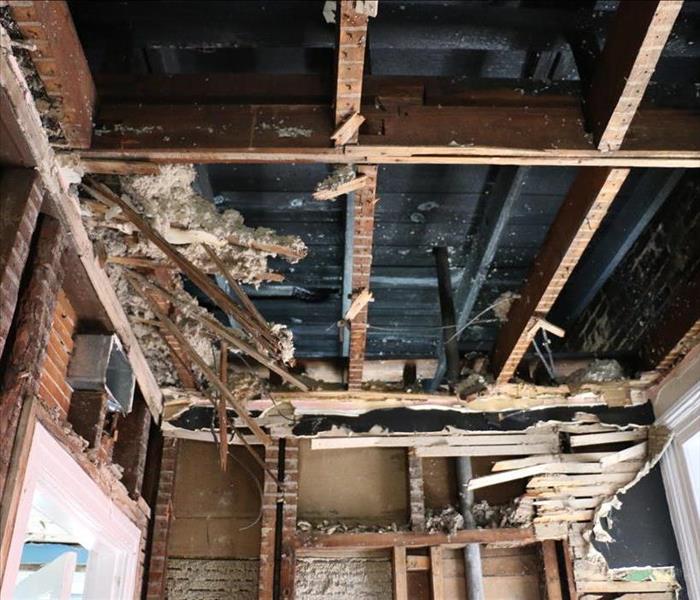
In the event that your home in Richmond suffers fire damage, you may be struggling to complete the restoration process. As many homeowners know, there are numerous tasks that you must complete to get back on your feet and restore your property. Some of those tasks include meeting with insurance agents, doing an inventory of damaged materials, and dealing with the emotions that result from enduring a traumatic event. The above steps are valid for a small, localized fire event. You may need to hire a professional fire damage restoration company like SERVPRO to assess damages and complete the fire damage restoration process. If there is any depth to the fire damage allow SERVPRO to communicate with your insurance adjuster and do an on-site assessment and inspection of the fire damage in your Richmond home. A proper water removal, drying, cleanup and repair plan than can be professionally initiated.
Let The Professionals Of SERVPRO of Richmond Assist You
Once your home in Richmond has been impacted by fire damage, it's critically important that you obtain excellent, expedient remediation services from a highly qualified company like SERVPRO. By communicating with you and your insurance company an efficient, cost-effective plan of action can immediately start. Our commitment to excellence, training with IICRC certification, and equipment have made us the industry leader with over 1,700 franchises. Allow us to release you from unwanted stress and get you back home.
SERVPRO of Richmond is locally owned and operated. Call us for help for fire or water damage assistance. (804) 740-6151
Fire Prevention Week
10/9/2018 (Permalink)
This year’s Fire Prevention Week campaign, “Look. Listen. Learn. Be aware. Fire can happen anywhere,” works to educate people about three basic but essential steps to take to reduce the likelihood of having a fire––and how to escape safely in the event of one:
LOOK
Look for places fire could start. Take a good look around your home. Identify potential fire hazards and take care of them.
LISTEN
Listen for the sound of the smoke alarm. You could have only minutes to escape safely once the smoke alarm sounds. Go to your outside meeting place, which should be a safe distance from the home and where everyone should know to meet.
LEARN
Learn two ways out of every room and make sure all doors and windows leading outside open easily and are free of clutter.
This week is an also an opportunity for local firefighters to visit schools and teach children the importance of fire safety. They want to make sure you’re doing all you can to keep your family safe. Firefighters are also encouraging smokers to make sure they throw out butts and ashes correctly because it only takes something small to spark a fire if the conditions are dry.
For more info please visit: http://www.nfpa.org/Public-Education/Campaigns/Fire-Prevention-Week
The Right Equipment for Fire Damages
7/11/2018 (Permalink)
We believe at SERVPRO of Richmond that the right tools for the job is vital to timely mitigation and restoration, but perhaps more important, SERVPRO of Richmond fire damage professionals are thoroughly trained in fire cleanup and restoration. For instance, knowing the different types of smoke and their behavior patterns are vital to proper restoration.
- Wet Smoke – Plastics and Synthetics; Low heat, smoldering, pungent odor, sticky, smeary.
- Dry Smoke – Paper and Wood; Fast burning, high temperatures, dry, powdery, nonsmeary residues.
- Protein – Virtually invisible, discolors paints and varnishes, extreme pungent odor.
- Fuel Oil Soot – Furnace Puff Backs.
- Other Types – Tear gas, fingerprint powder and fire extinguisher residue.
Deodorization Equipment
Ultra Low Volume (ULV) Foggers will atomize liquid deodorizing agents, producing a fine mist that easily penetrates sites where odor-causing residues accumulate. The device can also be used to apply fungicides and disinfectants.
Thermal Foggers dispense solvent-based products in large volume, dense fogs suitable for confined areas. The fog consists of tiny particles of deodorant solution that pair with and neutralize odor-causing particles.
The Importance Of Attaining Professional Fire Damage Repairs in Chesterfield
8/23/2015 (Permalink)
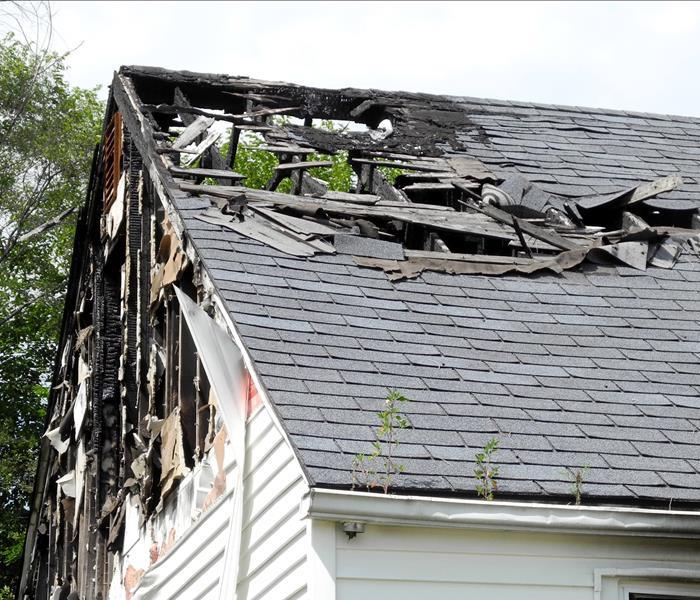 Fire Damaged Roof Needs Professional Repair
Fire Damaged Roof Needs Professional Repair
A Fire Damaged Chesterfield Home Needs Restoration
When a Chesterfield homeowner finds himself grappling with a fire in his home, the first instinct is often to run back into the house to remove any valuable possessions. However, this activity can present a host of problems given that fire damage tends to weaken the structural integrity of the house. Additionally, the smoke that results from the house fire can generate toxic chemicals that cause health problems if inhaled. It is wise to stay out of the structure, therefore, preventing the possibilities of injuries from these dangers. It is important to obtain professional fire damage repair services. Restoration companies possess the expertise, experience, and equipment necessary to restore order to your home in Chesterfield. Learn more about the value of attaining professional fire damage repair services by reviewing the following information:
Assessing Fire Damage Repairs
One of the first and most important services a professional restoration company will offer is the assessment of your fire damage. To accomplish this work, the company's professionals will complete a fire damage assessment. The task will consider both exterior and interior fire damage that have affected your property. This process includes numerous steps. Specific tools to measure damage, inspecting for hidden structural damage and taking pictures of the property are just a few of the required steps. Coordination between you, your insurance company and SERVPRO is a good first step.
Fire Damage Repair Services
A professional restoration company is skilled in offering a wide range of helpful fire damage repair services and should specialize in fire and water damage restoration. Restoring your residential property to its original condition as quickly as possible demands experience, equipment and a sense of urgency. First comes the repair and then the restoration to your home. Some of the services provided are:
• Removing and replacing drywall or flooring that has been damaged by water
• Preventing mildew and mold growth by drying excess water from your property
• Rebuilding and reinforcing your home's structure
• Using tools like ozone machines and dehumidifiers to eliminate smoky smells and moisture from your property
• Replacing plumbing fixtures or appliances so that your home can regain its original condition
Conclusion
As made clear by the information listed above, a professional fire restoration company can offer a wide range of restorative services once your home has fire damage. As a company committed to consistently offering ethical, excellent work, you can count on the professionals of SERVPRO to provide you with the precise, effective fire damage repair services you deserve. We're ready to assist you if the need should ever arise.
Locally Owned, with National Resources
We live and work in Chesterfield too; we might even be neighbors. As a locally owned and operated business, SERVPRO of Richmond is close by and ready to respond to your fire damage emergency. We are proud to be an active member of the Chesterfield community and want to pitch in and help make our community the best it can be.
When fire and water damage strikes, a fast response is critical. We’re dedicated to responding immediately night or day to your Chesterfield home or business. Call us. (804) 740-6151






 24/7 Emergency Service
24/7 Emergency Service
